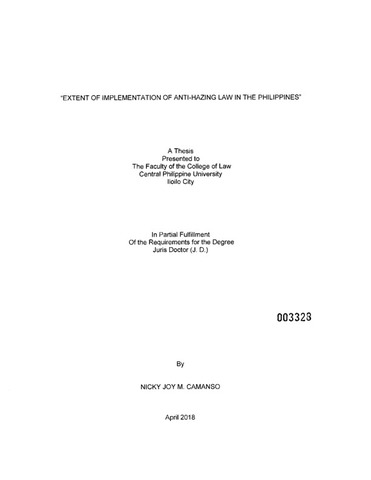Ipakita ang simpleng tala ng item
Extent of implementation of Anti-Hazing Law in the Philippines
| dc.contributor.adviser | Alibogha, Salex E. | |
| dc.contributor.author | Camanso, Nicky Joy M. | |
| dc.date.accessioned | 2021-04-08T02:00:28Z | |
| dc.date.available | 2021-04-08T02:00:28Z | |
| dc.date.issued | 2018 | |
| dc.identifier.citation | Camanso, N. J. M. (2018). Extent of implementation of Anti-Hazing Law in the Philippines (Unpublished Postgraduate thesis). Central Philippine University, Jaro, Iloilo City. | en_US |
| dc.identifier.uri | https://hdl.handle.net/20.500.12852/734 | |
| dc.description | Abstract only | en_US |
| dc.description.abstract | This study was conducted in order to determine the extent of the Anti-Hazing Law in the Philippines. Descriptive method was used in this study in which qualitative research was adopted. The researcher was subjected to do a discourse analysis involving hazing related incidents, the effects of the Anti-Hazing to such incidents and the number of convictions where necessary data, reports and statistical records were examined and all issues and other important matters were extracted and analyzed. Based on the mentioned variables, the researcher will be using the purposive sampling and total enumeration wherein the selection of the population of the study will be based on the own judgment of the researcher. Thus, the researcher selected the different hazing related incidents based on online sources, news portals and statistical data. Based on the findings of the study from the gathered data, in terms of the extent of hazing related incidents, the researcher finds that hazing related incidents are widely extensive in the country since these incidents happen anywhere in the country as evidenced by the reported hazing incidents which were conducted in different parts of the country. In terms of the effects of RA 8049 in reducing hazing related incidents, based on the results of the study it shows that more of the hazing related cases were dismissed and despite of the existence of the present Anti-Hazing Law, hazing related incidents are more prevalent and initiation rites inflicting physical violence and other forms of abuse are still widely practiced by different fraternities. Despite the provisions of the law, these fraternities still practice their traditional way of recruiting and conducting an initiation rite. Moreover, the period of the study was conducted from year 2010-2016, but there was not any reported conviction regarding these hazing related incidents. Hence, the researcher provided some alternative suggestions in order to effectively and efficiently implement the Anti-Hazing Law. | en_US |
| dc.format.extent | viii, 64 leaves | en_US |
| dc.language.iso | en | en_US |
| dc.rights | Attribution-NonCommercial-NoDerivs 3.0 Philippines | * |
| dc.rights.uri | http://creativecommons.org/licenses/by-nc-nd/3.0/ph/ | * |
| dc.subject.ddc | Law Library 340.72 C140 | en_US |
| dc.subject.lcsh | Philippines Anti-Hazing Law | en_US |
| dc.subject.lcsh | Philippines. An Act Regulating Hazing and Other Forms of Initiation Rites in Fraternities, Sororities, and Other Organizations and Providing Penalties Therefor | en_US |
| dc.subject.lcsh | Hazing--Philippines | en_US |
| dc.title | Extent of implementation of Anti-Hazing Law in the Philippines | en_US |
| dc.type | Thesis | en_US |
| dc.description.bibliographicalreferences | Includes bibliographical references | en_US |
| dc.contributor.chair | Bedona, Zacarias D. Jr. | |
| dc.contributor.department | College of Law | en_US |
| dc.description.degree | Juris Doctor | en_US |
| local.subject | Anti-Hazing Law | en_US |
| local.subject | RA 8049 | en_US |
Mga file sa item na ito
Lumilitaw ang item na ito sa mga sumusunod na (mga) Koleksyon
-
Juris Doctor [144]



